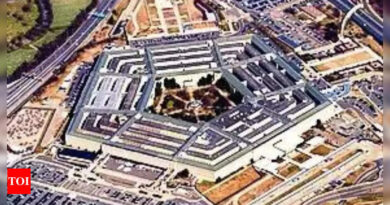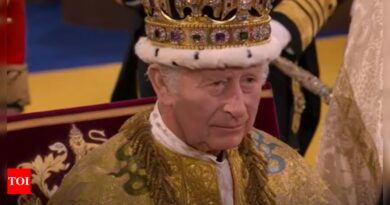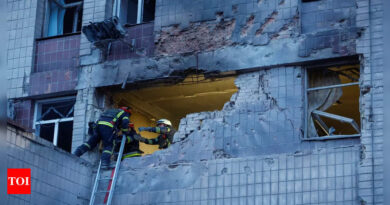Wars, religion and football: Five faces of Erdogan – Times of India
ISTANBUL: Abhorred and adored, Recep Tayyip Erdogan has been compared to sultans and pharaohs while stamping his outsized personality and domineering style on Turkey over 20 years.
Elected as prime minister and then as an uber-powerful president under a tailor-made constitution, Erdogan has become Turkey’s most important and polarising leader in generations.
A builder, a political brawler and a campaign beast, here are five of Erdogan’s most emblematic traits.
Filling Turkey with bridges, highways and airports, Erdogan has propelled the developing country into the 21st century with mega-investments, stimulating growth.
He calls them his “crazy projects”: a towering third bridge over the Bosphorus, another one across the Sea of Marmara, a third spanning the Dardanelles Strait.
They all set records, as did Istanbul’s Camlica Mosque — the largest in Turkey, replete with six minarets and space for 30,000 worshippers.
But perhaps the grandest of the megaprojects is the Istanbul Canal, being built just west of the Bosphorus on land the city once envisioned as an evacuation zone in case of a long-feared earthquake.
There is much more, including high-speed rail, a third Istanbul airport — designed to be the world’s largest — and power plants, including the country’s first nuclear one, controversially built by Russia.
Raised in Istanbul’s working-class district of Kasimpasa, the young Erdogan dreamt of little but football, kicking around a ball made of paper and rags, according to popular lore.
His tall frame — 1.85 metres, or just over six feet — made him a sought-after centre-forward.
He received offers from several professional clubs, including Istanbul’s Fenerbahce.
But his father, an austere sailor from the Black Sea, told him to pursue religious studies.
Erdogan gave up reluctantly but remained a big fan, mingling with players throughout his career.
In 2014, businessmen with ties to Erdogan’s ruling party acquired Basaksehir, the least storied of Istanbul’s six clubs.
Based in a conservative district of the same name, Basaksehir quickly became a powerhouse, winning the league in 2020.
Erdogan’s father would have approved if the future president had instead become an imam.
In the secular Turkey created by Mustafa Kemal Ataturk, Erdogan attended one of the first religious public schools, combining studies of the Koran with other subjects.
Islam became the rallying cry of his electorate and its new movement, called the Justice and Development Party (AKP).
Erdogan advocates piety, frowns on smoking and drinking, and defends traditional family values at the expense of the LGBTQ community and emancipated women.
The AKP celebrates motherhood as well as the wearing of headscarves at school and in the civil service — a right that Ataturk had abolished with Turkey’s formation in 1923.
A master campaigner who comes alive on stage, Erdogan is a gifted public speaker who relishes a challenge, priding himself on never losing a national election.
Derailed by stomach issues in recent days, past campaigns have seen Erdogan hop between eight cities in a day, giving impassioned speeches to crowds of supporters.
A populist and a performer, he announces pay hikes, kisses babies, hugs elderly women and even hands out small change to kids — a custom on religious holidays.
Pro-government media, which now dominates, lap it all up, broadcasting his performances live across the nation and replaying them deep into the night.
Erdogan has leveraged Turkey’s strategic position between Europe and the Middle East — guarding the southern shores of the Black Sea and the northern ones of the Mediterranean — to diplomatic advantage.
He assumed the role of mediator when Russia invaded Ukraine, becoming one of the few world leaders with open access to Vladimir Putin and Russia’s vast energy resources.
But he also supplied Kyiv with weapons and won international plaudits for helping broker a deal to resume Ukraine’s grain exports.
On the other hand, he drew Western wrath for launching incursions into Syria. At one stage, he appeared to be simultaneously brawling with all of Turkey’s neighbours, stretching from Iraq to Greece.
He broke off relations with Israel and Egypt, intervened in the war in Libya, and helped Azerbaijan defeat Armenia in their 2020 war over Nagorno-Karabakh.
Facing a new economic crisis, Erdogan has been mending fences, seeking investments and engaging in “earthquake diplomacy” with Greece after a massive February shock killed more than 50,000 people.
Elected as prime minister and then as an uber-powerful president under a tailor-made constitution, Erdogan has become Turkey’s most important and polarising leader in generations.
A builder, a political brawler and a campaign beast, here are five of Erdogan’s most emblematic traits.
Filling Turkey with bridges, highways and airports, Erdogan has propelled the developing country into the 21st century with mega-investments, stimulating growth.
He calls them his “crazy projects”: a towering third bridge over the Bosphorus, another one across the Sea of Marmara, a third spanning the Dardanelles Strait.
They all set records, as did Istanbul’s Camlica Mosque — the largest in Turkey, replete with six minarets and space for 30,000 worshippers.
But perhaps the grandest of the megaprojects is the Istanbul Canal, being built just west of the Bosphorus on land the city once envisioned as an evacuation zone in case of a long-feared earthquake.
There is much more, including high-speed rail, a third Istanbul airport — designed to be the world’s largest — and power plants, including the country’s first nuclear one, controversially built by Russia.
Raised in Istanbul’s working-class district of Kasimpasa, the young Erdogan dreamt of little but football, kicking around a ball made of paper and rags, according to popular lore.
His tall frame — 1.85 metres, or just over six feet — made him a sought-after centre-forward.
He received offers from several professional clubs, including Istanbul’s Fenerbahce.
But his father, an austere sailor from the Black Sea, told him to pursue religious studies.
Erdogan gave up reluctantly but remained a big fan, mingling with players throughout his career.
In 2014, businessmen with ties to Erdogan’s ruling party acquired Basaksehir, the least storied of Istanbul’s six clubs.
Based in a conservative district of the same name, Basaksehir quickly became a powerhouse, winning the league in 2020.
Erdogan’s father would have approved if the future president had instead become an imam.
In the secular Turkey created by Mustafa Kemal Ataturk, Erdogan attended one of the first religious public schools, combining studies of the Koran with other subjects.
Islam became the rallying cry of his electorate and its new movement, called the Justice and Development Party (AKP).
Erdogan advocates piety, frowns on smoking and drinking, and defends traditional family values at the expense of the LGBTQ community and emancipated women.
The AKP celebrates motherhood as well as the wearing of headscarves at school and in the civil service — a right that Ataturk had abolished with Turkey’s formation in 1923.
A master campaigner who comes alive on stage, Erdogan is a gifted public speaker who relishes a challenge, priding himself on never losing a national election.
Derailed by stomach issues in recent days, past campaigns have seen Erdogan hop between eight cities in a day, giving impassioned speeches to crowds of supporters.
A populist and a performer, he announces pay hikes, kisses babies, hugs elderly women and even hands out small change to kids — a custom on religious holidays.
Pro-government media, which now dominates, lap it all up, broadcasting his performances live across the nation and replaying them deep into the night.
Erdogan has leveraged Turkey’s strategic position between Europe and the Middle East — guarding the southern shores of the Black Sea and the northern ones of the Mediterranean — to diplomatic advantage.
He assumed the role of mediator when Russia invaded Ukraine, becoming one of the few world leaders with open access to Vladimir Putin and Russia’s vast energy resources.
But he also supplied Kyiv with weapons and won international plaudits for helping broker a deal to resume Ukraine’s grain exports.
On the other hand, he drew Western wrath for launching incursions into Syria. At one stage, he appeared to be simultaneously brawling with all of Turkey’s neighbours, stretching from Iraq to Greece.
He broke off relations with Israel and Egypt, intervened in the war in Libya, and helped Azerbaijan defeat Armenia in their 2020 war over Nagorno-Karabakh.
Facing a new economic crisis, Erdogan has been mending fences, seeking investments and engaging in “earthquake diplomacy” with Greece after a massive February shock killed more than 50,000 people.




